|
FAQs on the Orange Shoulder Tang, Acanthurus
olivaceus
Related Articles: Orange Shoulder Tang, Acanthurus Tangs, Naso,
Related FAQs: Acanthurus Tangs 1, Acanthurus Tangs 2, Acanthurus Tangs 3, Acanthurus ID, Acanthurus Behavior, Acanthurus Compatibility, Acanthurus Selection, Acanthurus Systems, Acanthurus Feeding, Acanthurus Disease, Acanthurus Reproduction, Powder Blue Tangs, A. sohal, A. nigricans
& A. japonicus, Surgeons In General, Tang
ID, Selection,
Tang
Behavior, Compatibility, Systems, Feeding, Disease,
|
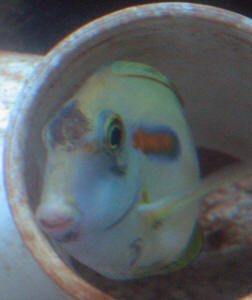 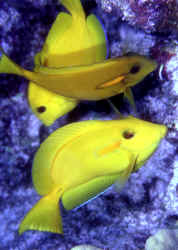
Too common: damaged in captivity, juveniles in the wild
|
Surgeonfishes: Tangs for Marine Aquariums
Diversity, Selection & Care
New eBook on Amazon: Available
here
New Print Book on Create Space: Available
here
by Robert (Bob) Fenner |
 |
|
Cloudy pop eye tang 7/8/17
Hi, thanks as always for the wonderful service you provide everyone! Your
advice, articles, and information are all super!
<Ah, good>
I have an orange shoulder tang I just got and apparently the sellers other fish
picked on it and damaged its eye.
<This beautiful species is on the end of the scale w/ a few others (Powder Blue,
Brown...) in terms of being hard to keep in captivity. REALLY needs a BUNCH of
room (hundreds of gallons)... VERY clean water...>
I attached a picture of the eye. It is in a 100 gallon stock tub QT now.
Should I treat the fish with something or just rely on good water quality and
food to help it get better?
<A tough question... as the bulging eye is unilateral/one side; this is highly
likely a case of trauma (rather than bacteria, parasitic...) issue>
If I should treat it what should I use? Does it look like it will be okay
eventually? Thank you!
<Let's have you read here re:
http://www.wetwebmedia.com/Popeyecures.htm
and the linked files above as much as you'd like; to gain perspective.
Unfortunately the prognosis for this species, kind of injury is poor. Bob
Fenner>
|
 |
|
Re: Cloudy pop eye tang 7/8/17
Hi Bob, thanks for the incredibly timely response. I read the FAQ's before
emailing, but didn't see a definitive answer, but after evaluating it more I
think what I'll do it wait and see.
<Ahh, yes. This is what I would do. This IS a fave species of Tang, esp. when
out diving in Hawaii, am always looking for its broad flanks scooting about the
bottom, feeding>
The fish came from someone's established tank and went to another reef keeper
whose fish picked on it, and then I got it so it is not brand new to a tank.
This evening I think the orange shoulder tang is looking a bit better. He is
eating Spectrum pellet food like a pig and picking on nori.
<Good food choices>
His eye looks close to the same. I'll just keep him in the 100 gallon QT tub for
a while and keep the water clean, it has a decent skimmer too. After that if he
is okay in 3-4 weeks he can go in my 300 gallon tank which has 500 gallons of
total volume going through it. Hopefully that'll be big enough. By the way, you
spoke at our reef meeting in San Diego and I saw you speak at the last MACNA on
butterfly fish, which I was contemplating getting but decided not to after
learning more about them. ��
<Ahh! Am hoping that Mark Lawson will help resurrect the San Diego Club. Have
offered to help in what ways I can/may... Giving programs, lining up others,
manufacturers, distributors for donations et al. Hope to see you at the upcoming
(August) MACNA in LA. Bob Fenner>
|
|
8 year old Shoulder Tang
1/27/17
Aloha,
<Howsit? Darrel, you owe me some part of twenty US... your too large file
wouldn't load here in Fiji. Had to sign up for the advanced svc. Hundreds of
Kbytes mate, NOT megs>
I really appreciate the service wet web media provides. Mahalo. To Bob
Fenner and the crew.
<Follow our guidelines then!>
I operate a Marine aquarium maintenance service and recently some thing
happened to an 8 year old shoulder Tang that I haven't seen before.
The Tang resides in a 650 gallon Fish only aquarium 8.2pH 40ppmNitr 1.021SG.
<A bit low>
About 3 weeks ago, a golden head goby I added died fairly quickly.. 2 weeks
or so after 15 days QT time. A little while after the Tang developed brown
splotches and started to hide.
<Mmm; likely not related>
With parameters in line, I immediately suspected parasites of some kind.
Close inspection of some of the other larger fish, 2 yellows, 3 Blue Hippos,
and a 10 year old Stars and Stripes puffer, revealed little.
Nothing evident on the fins, clear active eyes, no scratching, etc.
However the fish mostly clustered in one area of the reef insert for about a
week.
<Mmm; environmental. Something/s you don't measure are off>
There is also an 8 year old Heniochus that is mostly hiding but has no
visible discolorations.
Any advice?
<When, where in doubt, punt! Massive water change (like half), with gravel
vacuuming, addition of a few units of ChemiPure and PolyFilter in the flow
path. Bob Fenner>
Thanks in advance.
|
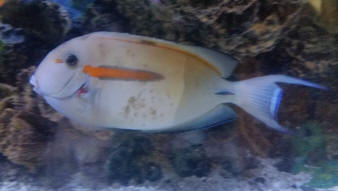 |
|
Re: 8 year old Shoulder Tang
1/27/17
Oh, the system also is running a 120 watt Emperor Aquatics Smart UV (40wx3)
6 months of service for the current bulbs.
<I'd be checking the Fe +2 and 3 coming off the igneous. B>
Darrel
Re: shoulder tang 1/27/17
Mahalo. I will send you a check or money order. U.S. funds?
<Heeeee! Thank you for the offer Darrel>
I already did everything you suggested prior to contacting you.. the
markings improved and then came back albeit in a different pattern. I will
repeat process.
Thanks again.
<This Acanthurus (does) suffer/s from many types of environmental (over)
stress. IF it's still eating, moving about... I give you good odds of it
recovering. A hu'i hou! Bob Fenner>
|
orange shoulder tang dorsal fin; beh.
4/22/15
Hi guys,
<Mark>
I have an Orange Shoulder Tang that been with me for around 18 months and is
close to 6" in length. It still has juvenile colors (but occasionally
turns gray/blue at night).
<What they do at night... helps to hide from predators>
My question is about it's dorsal fin.
For as long as the fish has been with me, it's dorsal fin has always remained
closed. The fish appears to be in good health otherwise, very active, feeding
well, no signs of parasites or other illness and growing well. Is this just a
random occurrence or something with which I should be concerned?
<Not a problem. The opposite of freshwater, marine fishes keep their dorsal and
anal fins mostly closed... whereas freshwater keep them raised... Your
Acanthurus would have its fins spread more if it were in a bigger system, one
with more circulation>
Many thanks,
Mark
<As many welcomes. Bob Fenner>
Problem with Orange Shoulder Tang
4/15/13
Hello,
I was searching online, trying to find out what the problem is with my
orange shoulder tang.
<Mmm, will tell you straight out that this is an Acanthurid species that
often doesn't do well in captivity. Needs a great deal of room
(psychologically)... as in hundreds of gallons... Can be VERY aggressive
toward other fishes, particularly Acanthuroids>
He is about 4"
<Ahh, small... likely damaged in collection, shipping>
and I've had him for about 4 weeks now. He is currently in my 90g
tank. He began showing dark blotches around his face and upper
body after having him for about 2 weeks. I am treating for Ich
<Trouble... see WWM re Tangs and treatments/Crypt>
as a fellow tankmate has it. During this time I did have a spike
in ammonia as well.
<... worse and worse. Toxic>
He is still eating really well, but he
swims erratically and jerkily and spends a lot of time under the
waterfall of the Aquaclear. I found a post on your site with
another orange shoulder tank with symptoms exactly the same as mine:
*Help With Sick Shoulder Tang, env. - 7/23/07*
Good afternoon, geniuses!
<Uhh... okay> First, thanks for such a great website. I've found so many
answers to so many questions on the site, that I've never needed to
write before now! <Yay!> I bought an Orange Shoulder Tang last weekend
from my LFS. Brought him home and put him in quarantine with a smaller
Sailfin Tang. <Mmm... I would NOT mix these...> They're in a 30-gallon
quarantine tank (too small, I know, but it's for a relatively short
time). <Like you, I and a black bear?> I noticed some small (very small)
gray spots on him when I brought him home and figured that it was just
discoloration or some pigment loss, but now the gray spot on his
forehead is getting bigger and seems like it might be growing outward
too. <Mmmm> It's behaviour is definitely different than it was. It swims
VERY fast, sometimes in a very jerky manner, sometimes brushes against
the gravel or PVC in the tank, but, a lot of time he spends in one spot
directly under where the water pours back into the tank after being
filtered. He has a really healthy appetite and goes crazy for frozen
herbivore food. <Ah, good> He's a beautiful fish and has a ton of
personality, so I don't want anything to happen to him! <This is one of
my fave Acanthurus species (of the 32...) and am out seeing them most
days while diving/snorkeling currently in HI> The tank setup is 30
gallons, has crushed coral on the bottom (going to be removing it
when/if these guys come out of quarantine) with a basic pump pouring
over charcoal/iorings filter. No protein skimmer yet (installing one on
Wednesday). <This will help for sure> Water quality is good - Ammonia
and Nitrite undetectable, Nitrates are 10-20. We did have a little bit
of ammonia in the tank a few days ago - 0.5 - but we did water changes
and it dropped down right away. Any idea what the problem could be and,
more importantly, any suggestions on what to do to rescue this poor guy?
He's obviously uncomfortable. By the way, the Sailfin is just fine.
Doesn't exhibit any problems at all. Thanks and I'm including two
pictures of him. Wes <The difficulty here is very likely "just"
environmental... This is a wide-ranging species (needs hundreds of
gallons really)... and even a trace of ammonia can be real trouble.
Improve this animal's world and all will be fine. Bob Fenner>
<Am familiar>
I just wanted to know if you know if the fish was fine and had
recovered?
<Can't tell; don't know>
Besides good food and clean water, is there anything else I can do for
him?
<Not really... perhaps bolstering immunity through nutrition... Read
here:
http://www.wetwebmedia.com/crypttangsf4.htm
and the linked files above...>
Thanks so much!
Sheila
<Ah, welcome. Bob Fenner>
Re: Problem with Orange Shoulder Tang
4/16/13
Thanks, it appears to be a serious bacterial infection. It took me
too long to figure that out so I'm not sure if he's going to make it or
not.
<Can be very hard to fix once advanced. BobF>
Tang acting weird. 2/23/2010
Hello crew!
<Hi Terry!>
My tank is a 380 Fowlr with a lot of fish in it, salinity is .023
<1.023?>
temp is 79, ammonia and nitrite undetectable as nitrate very
minimal.
<Ok>
My question is this. I have a Purple Tang which I've had for around
6 months now. He was very fat and happy in my previous 150 gallon
tank.
However after about 4 weeks in my 380 he began to act weird. He started
hiding all the time and quit eating.
<Did you add any other fishes in this time?>
He developed HLLE after a short time. After about 4 days I began to
worry because all of my other fish were eating and acting fine. Then
one day I saw him start to come out, and my orange shoulder tang then
started to display and flash at him, driving him back into hiding.
<Assuming the A. olivaceous was in the 150 as well, these are
re-establishing territories here, with, not surprisingly, the Olive
coming out on top>
I decided to take the purple tang out and put him into my 50 gallon
fuge.
<I would have removed the Acanthurus. Isolate the troublemaker from
the rest, not the other way around>
I thought he would get better and start eating again but he hasn't.
Then I started thinking that maybe the Orange Shoulder Tang could sense
something wrong with the Purple Tang and that was why he attacked him
(he hadn't attacked him before).
<Mmmm, a guessing game here re. as to what is their particular
'gripe' is, but I think it's safe to say that these are not
compatible. In fact, this Acanthurus is known as a troublemaker>
So I kept a watchful eye and their have been no signs of disease or
parasites, only rapid gill movement from a couple of the tangs. I also
noticed that the purple tang is also not flapping? his fins at the same
time like usual. So today I am feeding my display and notice that my
Hippo Tang is starting to do the same thing with his fins and he quit
eating.
<Really? That is a bit worrying. I would remove the Acanthurus here
and put the Zebrasoma back in. Perhaps the Paracanthurus is also
getting the 'rough edge of the stick'>
I'm worried, I don't think
it's lack of oxygen either. All my fish have been treated with
Cupramine and Prazi Pro including my Zebra Eel which is eating and
healthy.
<? Do you mean in-tank? THIS could be a cause, and Morays should NOT
be treated with metals, dyes of any kind>
Where so I go from here?
<If you are medicating your tank, stop. Isolate the Olive
Tang>
Thanks in advance,
<No problem Terry. Please do use the shift key to capitalise in
future.>
Terry
<Simon>
Orange Shoulder Tang Behavior
12/8/08 Hi Guys, <Hi Daniel> I am not having any
problems with anything just wondering about my Orange Shoulder's
ritual. I put a half a sheet of Julian Sprung's Sea Veggies ( I
rotate between the Green, Red, and Purple every 2 days) in the tank
everyday which the fish inhale with in a couple hours. While the Orange
Shoulder is eating he rotates from seaweed to eating sand to eating air
at the top of the tank in one corner. Then the cycle starts again. He
has been doing this since I have had him (1.5 years). I know why he
eats the sand but I am curious on why he eats the air. Any ideas?
Burping maybe? <Geez, I never witnessed behavior like this unless
oxygen content was low, but I'm assuming he only does this when
eating. Possibly Bob or members of the crew may chime in here.>
Thanks ahead of time. <You're welcome. James (Salty Dog)>
Daniel 135 gallon RR <Tang is appropriate size for this fish.>
The tank parameters are: Salinity: 1.025 <My preference here would
be 1.023> Nitrate: 0 ppm Nitrite: 0 ppm Ammonia: 0ppm Calcium: 450
ppm Temperature: 81 degrees F The inhabitants are: 160 pounds of live
Caribbean rock 120 pounds of live aragonite sand Chocolate Mimic
5" Scopas Tang 4" Orange Shoulder Tang 6" Pair Black
Percula's South Seas Devil 1" 2x Blood Shrimp 2" 2x
Cleaner Shrimp 3" Assortment of snails and hermits. Equipment is:
2x Mags 9.5 4x Hydor Koralia 3 Dual 400W Double ended 14k MH Single end
250 watt 14k MH SeaClone 150 protein skimmer Water changes happen once
a week at 15%
Re: Orange Shoulder Tang/Behavior
12/09/08 Thank you for the reply Salty Dog. Yes he only does
this when feeding. I took some pictures and a video of him doing this
to show you.
http://s101.photobucket.com/albums/m46/blackhemi35003/?action=view¤t=DSCF3034.jpg
http://s101.photobucket.com/albums/m46/blackhemi35003/?action=view¤t=DSCF3018.jpg
http://s101.photobucket.com/albums/m46/blackhemi35003/?action=view¤t=DSCF3010.jpg
http://s101.photobucket.com/albums/m46/blackhemi35003/?action=view¤t=DSCF3022.flv
<Well Daniel, this may sound silly to you, but I'm thinking this
guy is probing the surface looking for more food. Obviously, he knows
his meals come from the top. What do you think Bob, am I ready for
stand-up comedy in Vegas? <<Mmm, maybe>> Thank you
for sharing the photos/video. James (Salty Dog)> Daniel
Carrel
| Sick tang, social, env.,
Acanthurus... 08/28/08 Hello Crew, Thank
you for all your help in the past, it has been invaluable. I
noticed about a week ago my Orange Shoulder Tang was getting
a few "discolored spots" on his body. <I see
this> It seemed to be getting worse by the day until today
it seems as if it has covered most of his body with the
exception of fins and head. It doesn't appear to have a
texture or any depressions/lesions. Each spot just seems to
have a lighter coloration than what is normal. I looked in
The Conscientious Aquarist and on this site, but am still
uncertain. I have included a pic taken this am. None of my
other fish are affected (as of yet). Any thoughts?
<Something environmental... psychological perhaps...>
125 g reef tank sg-10.25 calcium- 450 KH- 9 nitrate- 0
nitrite- 0 ammonia- 0 phosphate- 0 1 Blue Chromis - Chromis
viridis 1 Green Clown Goby - Gobiodon histrio 2 Pajama
Cardinals - Sphaeramia nematoptera 4 Blue Streak Cardinals -
Apogon leptacanthus 2 Firefish Gobies - Nemateleotris
magnifica 2 Saddleback Clownfish - Amphiprion Polymnus 1
Sixline Wrasse - Pseudocheilinus hexataenia 1 Lawnmower
Blenny - Salarias fasciatus 1 Dusky Jawfish - Opistognathus
whitehurstii <These three above may be harassing this
fish> 1Royal Gramma- Gramma loreto 1 Dejardin's Tang -
Zebrasoma desjardinii 1 Orange Shoulder Tang - Acanthurus
olivaceus 1 Chocolate Mimic Tang - Acanthurus pyroferus 1
Yellow Tang - Zebrasoma flavescens <Or these other
Acanthurids> ---------- 20 fish total <Too much, mix
for this volume...> thanks in advance, Alan <I would
definitely be moving this fish elsewhere... Someone/s'
bugging it too much. Bob Fenner> |
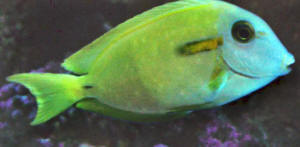
|
Internal Parasites Orange Shoulder
Tang 7/24/08 I purchased a small orange shoulder tang
from my LFS a few weeks ago and after treating it with Metronidazole, I
put it in my 90 gallon tank. It has been eating great and swimming
around from the start, but not gaining any weight. He is starting to
look skinny! I feed dried seaweed 3 times per week, brine shrimp, mysis
shrimp, blood worms and marine cuisine alternately. Should I add
anything to his diet or try to catch him and treat him again for
internal parasites. He is eating well and swimming ok. Tanks a lot!
Barbara <Hello, I would definitely treat the tang for internal
parasites if you are feeding him that quantity of food daily and he
seems thin, <<How? Referral? RMF...: >> I also recommend
keeping a veggie clip in the aquarium daily so he has food to graze on.
good luck, IanB>
Orange tang but not orange
shoulder 4/3/08 Dear WWM crew, this is whacked out. I
bought a fish today that looks like a tang and was labeled orange tang.
he is still a juvi and is gray with a black nose. it is weird though, I
was trying to find the scientific name of it so I knew what it will
look like when it is older and it was labeled orange tang. I called 8
pet stores that specializes in saltwater and none of them had ever seen
nor heard of this fish. isn't this weird. the only tang that has
orange in its name is the orange shoulder tang and I looked at many
pictures of the juvi of this fish and they are not the slightest thing
alike. the top fin looks halfway between a Sailfin or yellow tangs fin
and a Naso or hippo tangs fin. it is not exactly like either one almost
a mix. is it possible that I got a mix breed ore is there really
another orange tang that is not the orange shoulder tang. thanks.
<Juvenile Orange Shoulder Tangs are yellow so that is not what you
have. Please send a picture if you will for a better identification.
Also when you respond, please use the appropriate capitalization and
lack of abbreviation as I cannot go through the messages and correct
them all. --Yunachin>
Orange Shoulder Tang,
fdg. 2/11/08 Lately my Orange shoulder tang has
been eating substrate, should I be worried about this? <Mmm,
maybe... they, Tangs "do this" though naturally... adds
substrate and triturating material to their digestion> he eats it
like crazy and then picks at the rocks like there's no tomorrow.
He's not skinny but his stripe is not very dark anymore and he
looks a little pail every now and then. I feed frozen mysis, brine,
Cyclop-Eeze, omega one veggie <Mmm, needs more greenery... Red and
Green algae... I would try/use Spectrum pelleted food> and he will
eat them all but I cant for the life of me get him to go for any of the
Caulerpa, Ogo, short leaf macro or any of the algae sheets I try. Is
that fine? <Oh! Surprising...> he is about 2.5". Also was
considering adding a Sailfin to the tank as well but I have read
articles that say you shouldn't and articles say that it is fine.
Your thoughts? He's in a 72 bowfront. Thanks for all your help in
advance. Kevin J Court <This species does need more room than
this... I would keep offering the algae in various formats, but
definitely switch to Spectrum as the principal food. Please read here:
http://wetwebmedia.com/foodsppt1.htm Bob Fenner>
|
Olivaceus Tang hlth 2/2/08 Hi
guys <B and L> Your website is great and has provided us
with many helpful tips and suggestions. <Our hope> We are
located in Aus, and have a 10 x 2 x 2 tank, which we added a
large Olivaceus/Orange Shoulder tang to a week ago. <Am out in
some of this species prime territory (Hawai'i)
currently...> He seems to scratch and smack himself in the
head with his fin and has had these black marks appear recently
(see attached). <I see... typical "break down"
syndrome...> I lost a tang which had very similar marks on its
body a few years ago. He is swimming and eating well. Other tank
mates are Blue/Regal tang, Lipstick tang, Sailfin tang, Emperor
angel, Blue Face angel, Blue Spot Sting Ray and Zebra eel.
<Yikes... I do hope this system is huge> Testing all our
parameters I cant find anything out of the ordinary. Can you help
in any way, by letting us know what it could possibly be and how
to treat it? Thanks in advance for your time. Brett and Leanne
<As you state, this specimen is feeding well... I would
introduce and feed (likely exclusively) Spectrum pelleted foods
to all the stock you list... Please read here re:
http://wetwebmedia.com/foodsppt1.htm This food by itself will
greatly bolster the immune system of the Acanthurus, and help to
lessen aggressive behavior/stress amongst all... Bob
Fenner>
|
|
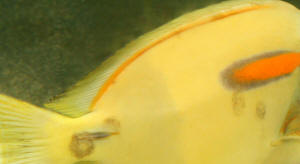
|
Two more questions. Orange Shoulder
Tang beh., Chrysurus A HLLE? 11/25/2007 Thanks again Bob.
<Welcome Steven> Two more questions and then I won't bother
you (at least for a while). I have two fish that I wanted your opinion
on their coloration. First I have a Orange Shoulder tang that I bought
about 1 1/2 years ago that was / is a juvenile about 3.5" long.
<Neat animals> He has grown maybe to 4" but is still yellow.
He has the outline where the orange oval will appear but that is about
it...no signs of wanting to change and doesn't grow very fast. How
long would you guess until he begins his adult color change? <A bit
longer... perhaps a half to a full year. This fish is right about where
such changes occur size-wise. Am in the process of sorting some of the
genus Acanthurus tangs FAQs, including this one... and am out in HI
currently... where most of this species are collected for the trade>
Second question is I have a Chrysurus (sp?) angel and have had him for
about 1 year. He is approximately 5" long and has recently started
to turn color around his mask (head area). At first I thought it was
some sort of fungus, but have seen a few photos on the web and have
seen the exact same marking, but these photos also only show the head
area to have this coloration. Will he change completely or will this be
the extent of it? <Only time can tell here> It kind of
doesn't look as pretty as he did before this change, but if the
entire body turned this kind of yellow/tan color it would look nice.
<There often is a bit of lightness, a sort of mask with this
change... I do want you to consider the possibility that this might be
HLLE... Please read here: http://wetwebmedia.com/hllefaqs3.htm and the
linked FAQs files above. Bob Fenner> Your input is greatly
appreciated. Thanks, Steven
Orange shoulder tang... no info.,
apathy? 8/16/07 I have an orange shoulder tang that I
bought last week. The mouth is swollen and has gotten worse within the
last few days. I wanted to know if this was normal. <Ah, no>
Thanks, BE <Not an easygoing species... alpha type... that does not
take to collection, shipping, being kept in small volumes... Please use
the search tool on WWM re Acanthurus olivaceus, and read here:
http://www.wetwebmedia.com/acantdisfaqs.htm and the linked files above.
Bob Fenner>
Acanthurus olivaceus pooping behavior, BGA
control 10/30/05 Steve here. <Bob here, HI and Hi> Hope this
email finds you well. <Yes, thanks> A couple of questions: I have
a Juvenile Orange shoulder Tang around 3.5" long and have had him
a few months now. He acclimated very well and getting along with his
mates. He eats well, grazing off of 250 lbs. of live rock, Nori on a
clip, and variations of Omega Flake food, Ocean Nutrition Pellet w/
garlic, frozen cube, etc. <We're out diving with this species
most days> My question is that when he "poops" a steam of
what looks like sand comes out. <Good observation> It almost
looks like my very fine live aragonite sand that is in the deep sand
bed. He picks and feeds off of the sand bed along with grazing off of
the live rock. I can see his ribs, but I think I read on your site that
it was not uncommon amongst Tangs. <Correct... they do
ingest bits of substrate... sort of helps... like some birds'
crops... with tritiation/chewing...> Second question: I wrote
recently about a fight with Red Cyano that has been forming on the sand
bed. I physically remove it (siphon) and have performed weekly 10%
water changes, watching that I don't feed more than the fish can
eat and not adding any other nutrients to the tank. The tank is 215
gallons, 50 gallon wet/dry, refugium with Caulerpa, 250# of Tonga live
rock and the water parameters are fine, ammonia 0, nitrite 0, nitrates
10 ppm, salinity 1.024, water temp 80.5 - 81.5 F. I have ready on your
site that treating chemically is not advised, so I have been doing all
of the things this site recommends like clock work for two weeks and if
anything it has gotten a little worse. <Mmm, you might want to
consider modifying that wet-dry, switching to another genera/species of
macroalgae... perhaps improving your skimmer/skimming...> I put a
sock of Phosphate granules, increased aeration, cut down on nutrients,
and performing water changes weekly (at least 10%). My Ph has remained
stable at 8.3. Please let me know if I am missing anything, or should I
be looking at something like Chemi Clean (by Boyd)? I don't want to
add anything that will kill my live rock, or good bacteria and I
suspect that anything that will kill Cyano bacteria may do so. Thanks
for your words of wisdom. Steven <Don't know re wisdom... but do
take a read (again?) through the WWM files on Cyano... not hard to
control once you know how. Bob Fenner>
Orange Shoulder Tang 8/28/05 Hi
Bob,
I've
been receiving mixed signals about the Orange Shoulder Tang. Your site
says that it is extremely aggressive, comparable to the clown tang. But
FFX and the Marine Fishes book says that it is fairly peaceful. If you
could help me sort this out I would be very grateful. <Brian, from
info that I can find, it is a peaceful fish. If keeping more
than one, it is advisable to put both in at the same time, or if
keeping with other tangs, put the Orange in first. They do
require a large tank, 135 gallon minimum.> Also I have an
orange skunk clown that has a case of ich that is puzzling me. I mean
that it isn't acting the way ich normally does. Some days he is
covered in spots, others he is ich free. I guess this is stress related
so I've been soaking his food in garlic drops. I am going to give
him a freshwater dip to rid him of the bulk and then put him in a
hospital tank and medicate him. I f there is anything else I can do,
could you please tell me. <Do just as you say. Might want
to add some Selcon to his food. James (Salty Dog)>
Thanks
in advance <You're welcome> <<RMF still stands by the
opinion that this is one of the more aggressive Surgeonfishes... best
to have it be the purposeful "king of the tank"...>>
Brian
| Help With Sick Shoulder Tang, env. -
7/23/07 Good afternoon, geniuses! <Uhh... okay> First,
thanks for such a great website. I've found so many answers to
so many questions on the site, that I've never needed to write
before now! <Yay!> I bought an Orange Shoulder Tang last
weekend from my LFS. Brought him home and put him in quarantine
with a smaller Sailfin Tang. <Mmm... I would NOT mix
these...> They're in a 30-gallon quarantine tank (too small,
I know, but it's for a relatively short time). <Like you, I
and a black bear?> I noticed some small (very small) gray spots
on him when I brought him home and figured that it was just
discoloration or some pigment loss, but now the gray spot on his
forehead is getting bigger and seems like it might be growing
outward too. <Mmmm> It's behaviour is definitely
different than it was. It swims VERY fast, sometimes in a very
jerky manner, sometimes brushes against the gravel or PVC in the
tank, but, a lot of time he spends in one spot directly under where
the water pours back into the tank after being filtered. He has a
really healthy appetite and goes crazy for frozen herbivore food.
<Ah, good> He's a beautiful fish and has a ton of
personality, so I don't want anything to happen to him!
<This is one of my fave Acanthurus species (of the 32...) and am
out seeing them most days while diving/snorkeling currently in
HI> The tank setup is 30 gallons, has crushed coral on the
bottom (going to be removing it when/if these guys come out of
quarantine) with a basic pump pouring over charcoal/biorings
filter. No protein skimmer yet (installing one on Wednesday).
<This will help for sure> Water quality is good - Ammonia and
Nitrite undetectable, Nitrates are 10-20. We did have a little bit
of ammonia in the tank a few days ago - 0.5 - but we did water
changes and it dropped down right away. Any idea what the problem
could be and, more importantly, any suggestions on what to do to
rescue this poor guy? He's obviously uncomfortable. By the way,
the Sailfin is just fine. Doesn't exhibit any problems at all.
Thanks and I'm including two pictures of him. Wes <The
difficulty here is very likely "just" environmental...
This is a wide-ranging species (needs hundreds of gallons
really)... and even a trace of ammonia can be real trouble. Improve
this animal's world and all will be fine. Bob Fenner> |
|
 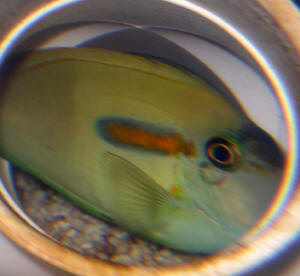
|
Possible HLLE or injury to Acanthurus
4/5/07 Hi Crew. <What's up Ryan?> Can you tell me
what the splotch is above my orange shoulder's left eye?
<Mmm...a little blurry but appears to be either a physical
abrasion or perhaps the start of Head Line Lateral Erosion...I
would check WWM articles re: to see how it compares as well as
possible effects and treatment. Judging from the
abrasion only being on one side of the animal I would just wait it
out, pristine water quality and an appropriate diet, and watch for
possible aggression as well.> I've included three pics so
you can see. Any help would be MUCH appreciated. Thanks
in advance.
<Welcome.>
Ryan <Adam J.> |
|
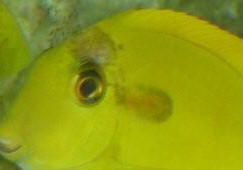
|
Question regarding a sick tang 12/23/06
Hello WWM Crew <Cole> Hopefully you can help me with the
following problem. I'm getting pretty desperate and I'm worried
sick about my tang. I went on vacation for a week and had someone look
after my tanks. When I came home I noticed my orange shoulder tang kept
hiding and didn't eat anymore. <Unusual for such a bold species
once acclimated> The person who looked after the tank told me that
the tang stopped eating 3 days after I left. We usually feed them twice
a day but when we were away, he only got fed once a day. I've been
home for a week and he's still not eating. He hides in a cave all
day and only comes out when the lights go off. He swims around and it
almost seems like he can't see well and he keeps swimming into
things. I put my hand in the tank and he bumped into it. He spends a
lot of time swimming up and down in one corner. All the levels are
normal and none of the other fishes are sick. (He shares the tank with
Anthias, a flame angel, a coral beauty, several cardinals etc) All the
SPS and LPS corals and a sea star are doing ok. I've had him for
over year and a half and he's been very healthy until now. He used
to like eating from my hand and interacting with me daily. He was
always more like a puppy than a fish. I can't see any visible
marks/fungus or spots on him. He's not scratching or twitching and
his balance seems ok. I don't think his eyes are cloudy either. He
doesn't seem to have any HLLE symptoms either. I could take him out
and put him in a separate tank and treat him but I'm not sure what
to treat him with. I understand sometimes tangs get stressed out and
get sick. Is it possible that someone else looking after the tank
caused him to get stressed out? <Mmm, no> What could cause his
illness? <Most likely a nutritional deficiency... possibly a
pathogenic disease... internal... specific to this one fish>
Anything I can do? I added a new ChemiPure, a PolyFilter and did a
partial water change already and been over skimming for several days.
<All good moves> I haven't moved him as I'm worried about
stressing him out even more. What could I treat him with? Thank you in
advance for any help and advice. Cole in Vancouver, Canada <I would
add a vitamin supplement both to offered foods and to the water
directly. Please read here: http://wetwebmedia.com/nutrdisf.htm
Bob Fenner>
Surgeonfishes: Tangs for Marine Aquariums
Diversity, Selection & Care
New eBook on Amazon: Available
here
New Print Book on Create Space: Available
here
by Robert (Bob) Fenner |
 |
|
|

